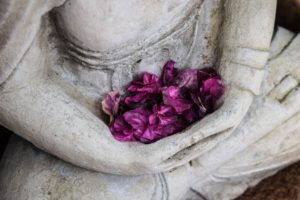by Jenny Rose | Feb 28, 2019 | Power

Photo by Chris Kristiansen on Unsplash
I think of myself as a goal-oriented, disciplined person. Most of the time I know what I want (at least I think I do). Some of the time I’m intentional and present with my choices. I like routine and can be both dogged and stubborn.
Outcomes have always been important to me. I set my sights on what I want to happen and started trying hard to achieve that desired outcome.
I don’t remember ever being taught creating certain outcomes is the way to live successfully and happily, but I structured my choices and behavior around that belief. A desired outcome was success, and therefore good. An outcome I didn’t want was failure, and therefore bad.
I didn’t consciously notice for much of my life that trying to create just the right outcome never worked well for me.
When I came to Maine and learned emotional intelligence, I started thinking about personal power and I finally really looked at how strongly desired outcomes motivated me. I was furious when I first came across the idea of letting go of outcomes. What I heard was invalidation and rejection of my ability to make long-term goals and plans and steadily, a step at a time, work toward them. I also thought I was hearing it was inappropriate to have dreams and desires. How could one navigate through life without caring about outcomes?

Photo by Jeremy Bishop on Unsplash
It took time, a lot of exposure and a couple of difficult and painful events, but eventually I understood investment in outcomes was the problematic piece, not having needs and desires or the degree to which we are disciplined and can tolerate delayed gratification.
We do not have complete power in the way things work out because our goals and plans inevitably include others.
By others I mean other people (the job, college or mate we want), whatever our conception of the Divine might be, and influences like the weather, the stock market, the tax return we counted on, the housing market, the weather, our state of health, and a thousand other variables.
Outcomes are as unpredictable as a loose cannon on a rolling deck, yet I based my happiness and sense of worth on them for most of my life.
For the most part I was unhappy, anxious and felt like a failure.
Then, somewhere I read or heard this little phrase: “However it needs to be, it’s okay with me.”
When I first came across it, I felt angry. It was a blatant lie. I was reluctant to think it, let alone say it. On the contrary, I was deeply invested in outcomes.
But I kept noticing it didn’t work well to live that way.
For some time I watched myself using all my energy in the tension of trying to create specific outcomes that eluded me.

Photo by Talles Alves on Unsplash
In my usual buttheaded fashion, I hung on grimly. If I wasn’t seeing the outcomes I intended and wanted, it was because I didn’t deserve them. Or I didn’t work hard enough. Or I was so broken and stupid nothing would ever work for me. Or the world was against me.
It was much easier to hate myself, an old habit, than consider the possibility none of us can really control outcomes. It was easier to blame others than change myself.
What we can control – the only place our personal power resides – is what we do with ourselves in terms of our beliefs, choices and behaviors.
Deciding how to think about outcomes is part of our personal power.
I formed a conscious intention of experimenting with letting go of outcomes. One of my very first explorations into that was this blog.
One of the biggest problems with attachment to outcomes for me is the outcome looms so large it overshadows the hundreds of small pleasures in life, as well as my delight and curiosity in the journey I take through each day. I’m too busy trying to get to an outcome to notice or appreciate anything else. Attachment to outcomes means there’s only one very specific way I can feel successful or happy, and in order for that to happen all the stars must align just right and everyone and everything around me must behave exactly as I want them to. Otherwise I’ll be resentful, depressed, discouraged, hurt, or some other kind of miserable.

Photo by Alex Iby on Unsplash
Attachment to outcomes is also a relationship killer. Whatever it is we want our children, parents, spouses, colleagues, bosses and friends to do or be (or not do or be), the fact is they are not pawns on our chess board. They are not paper dolls. They are not (hopefully) ours to control.
If we cannot accept our loved ones (or ourselves, for that matter) for who they are, we will lose them.
Attachment to outcomes comes with a heavy burden of fear and anxiety. As long as an outcome is “good” or “bad’ in our minds, both hope and fear attach to it. We invest energy in trying to avoid certain events and foster others. We try to figure out how to manipulate and influence the situation so it turns out the way we want.
We lose sight of the others around us very quickly. If we have our hearts set on a job, for example, even though we’re not well qualified for it, we do whatever it takes to get hired, never considering someone else might be a better fit. Someone else might be more desperate than we are for the job. The organization might need a specific set of skills and talents we do not possess. Another job opening we’re not yet aware of might be the place we’re most needed and will be most happy.
Attachment to outcomes can make us small and rigid, selfish and resentful.
So what does it look like to let go of outcomes?
Change and the unexpected are no longer fearful, but interesting. We make space for them. We have increased room for others because we’re not trying to control them. We take life less personally. We are confident and clear in our own power.
To let go of outcomes is to let go of distractions. It frees up space and energy to consider our own integrity, expression and needs. If we want to give a gift, we do it without worrying about how it will be received, if it will be reciprocated or how it will be judged. We give because it makes us happy and gives us pleasure to do so.
If we are artists, we create because it gives us joy, because it’s what we were born for. We don’t use our talent as a tool to leverage fame and riches. That doesn’t mean fame and riches won’t come or our art is not worth getting paid for, it just means that’s not an outcome that drives us.
Letting go of outcomes means letting go of feeling victimized, resentful and betrayed. We don’t take disappointment personally. Life is not all about us.

Photo by rawpixel.com on Unsplash
Letting go of outcomes makes room for cooperation and collaboration. We see others more clearly, lovingly and respectfully. We’re a more elegant team player. We enjoy working with others without the need for competition or power and control. We look for ways to share and nurture power. We give up the blame and shame game.
Letting go of outcomes means letting go of regrets. We make space instead for all outcomes, whether intended or not, comfortable or uncomfortable. We go forward with our best, most honest and heartfelt effort and have fun, letting the rest take care of itself. We use our time and energy to cultivate curiosity, wonder and gratitude for whatever happens.
Letting go of outcomes starves our anxiety, depression and insomnia. If we can position ourselves in life with confidence, surrender and acceptance, we build resilience and joy.
Let me hasten to say releasing outcomes is hard work. I find, somewhat to my chagrin, at times I’m invested in my resentment over the way things work out and my sense of betrayal. I don’t want to be soothed, comforted, or challenged to consider my experience from a different perspective. I want to be left alone to suck my thumb and pout, my version of a tantrum. Managing my expectations and attachment to outcomes is a work in progress.
I also do not deprive myself of the pleasure of making and achieving personal goals having to do with exercise, building skills, playing, relaxing or learning new habits. Those kinds of outcomes are well within my power to pursue.
When I feel frustrated and as though nothing ever works out for me, I’ve developed the habit of saying aloud to myself: “How ever this needs to be, it’s okay with me.” If it feels like a lie in my mouth, I start poking at the situation and asking myself why I’m attached to a particular outcome. I put my energy into taking a step back and reevaluating the situation until I really am okay with whatever outcome occurs. I summon my curiosity, warm up my gratitude, invite my sense of humor to awaken and go forward.
It’s the difference between rolling out of bed and telling the day how it must be in order for me to be happy or rolling out of bed wondering what the day will bring and choosing to enjoy whatever that is in advance.
It’s the difference between arguing with what is and acceptance.
It’s the difference between feeling disempowered and standing firmly in my own power.
However I need to be, however you need to be, however this day needs to be, it’s okay with me.

Photo by Dan Gold on Unsplash
All content on this site ©2019
Jennifer Rose
except where otherwise noted
by Jenny Rose | Oct 11, 2018 | Contribution, Emotional Intelligence
When I went through emotional intelligence training, I learned about three basic human needs: Contribution, connection and authenticity. If these primary needs are not adequately met, our lives don’t work well. I’ve written about my wary relationship with my own needs before. As I explore emotional intelligence, I’m struck by the simplicity of the three basic needs, the paradoxical complexity of each one, and the unique ways, often unconsciously, we each approach getting these needs met. I also notice the way these needs are inextricably woven into each other.
In these first couple of weeks of a new job, it’s been necessary to build a new schedule, which felt overwhelming until I remembered the three basic needs. I’m a creature of habit and I quickly stop assessing how I spend my time once I have a workable schedule. I engage with activities I’m accustomed to engage with and that’s that.

Photo by John Salvino on Unsplash
When I trained as a medical transcriptionist and started working from home, I was motivated by the necessity of earning a living and managing my then-teenage sons as a single mother. Medical transcription was a perfect solution. Gradually, without me really noticing, I allowed the job to become a prison. The boys grew up and moved out. I was promoted twice, but never earned a comfortable living. The job came with intense pressure that triggered my stress and perfectionism. It was isolating. It was difficult physically and keyboarding began to give me overuse injury.
I depended on my inadequate paycheck. It was the only income I had.
I was stuck.
I was aware during the last couple of years I worked as a transcriptionist that the job was no longer meeting any of my needs, aside from the paycheck, but a paycheck is kind of essential. In fact, in my mind it was the essential priority in my life, and I labored away in spite of migraine headaches and increasing pain in my upper extremities and shoulders until the day came when I could no longer keyboard without sobbing and I developed a frozen shoulder. I couldn’t take off my shirt without feeling faint from pain.

Photo by freddie marriage on Unsplash
The hardest thing about that job was not the poor pay, but feeling my contribution didn’t matter. The medical professionals were dictating into a piece of equipment and rarely, if ever, considered the human being trying to transcribe their dictation, unless it was to complain and criticize errors. The company I worked for is a huge global conglomerate on the cutting edge of speech recognition technology and a whole host of other businesses. I was nameless and faceless. All training and in-services were done remotely. Management had a high turnover. Changes happened without notice, like getting transferred to a new book of business. Overtime, when needed, was mandatory. Transcriptionists were expected to work 24/7 and weekend shifts were required.
Many people can type quickly and accurately. It’s mostly a matter of practice. I was a pair of hands and ears racing the clock, along with hundreds of others like me, both here and overseas. The job wanted no authenticity from me or anyone else. It’s a job for robots.

Photo by Edu Lauton on Unsplash
I am not a robot.
I’ve been seeking a new job because I want to start earning income again, but this time I promised myself I wouldn’t take a job that didn’t feel meaningful to me, and I knew exactly what I meant by meaningful. A meaningful job is not about the paycheck. Yes, obviously, I need money in today’s world. Not a lot, but some. Enough to justify my time, travel and commitment. However, the work I do in exchange for a paycheck of any size is only meaningful if it makes a positive difference in the lives of others. I don’t want to be paid for being a robot impersonator. I want to be paid because I contribute something wanted or needed out of my own authenticity.
Working as a member of a team in order to keep people safe, assist patients in rehabilitation, and teaching swimming feels meaningful and allows me to work from the heart. In my little corner of the world I can be part of something healthy and healing for myself and others.
As an ex-people-pleaser, I endeavored for most of my life to make a positive difference in the lives of my family and immediate connections. I worked as hard as I could at it, and making a meaningful contribution was my top priority. In spite of all my efforts, I failed. In fact, it seemed the harder I tried the more obnoxious I was to those around me. Naturally, I concluded that I was nothing. I had nothing to offer that anyone wanted. It would be better for everyone if I disappeared and relieved them of the burden of my presence.
Two important things I’ve learned from those years are people pleasing doesn’t work, and some people are determined never to be pleased. I learned to define for myself what a “good” job is. I began to seek paid work I enjoyed as much as volunteer work and kept my focus on the feeling of making a positive contribution.

Photo by Cristian Newman on Unsplash
I see and hear a lot of discussion about the increasing problems of loneliness and depression, and I suspect many of those affected feel unable to make a meaningful, authentic contribution in their families and/or communities. Somewhere along the way we decided a paycheck is more important than the quality of our contribution, but ultimately, as human beings, no paycheck is an adequate substitute for feeling our contribution matters. Our culture does not necessarily reward authentic contribution. We like our infallible robots and good soldiers, those who do and say exactly what they’re programmed to do and say. Loose cannons like me are a problem nobody wants in the classroom or the boardroom.
I’m sorry I believed for so long I had nothing to contribute. It made me miserable and was the root of many destructive choices. Now I believe we all have a great deal to offer, and someone out there needs exactly what we can contribute. What would the world be like if every man, woman and child truly felt they had something unique to give that made a positive difference in just one other life? What if contributing and receiving contributions were not tied to money? What if we all woke up in the morning knowing the world is a better place because of our presence?
What would it take to make that a reality for everyone?
I’m fortunate to have found a way to make an authentic, meaningful contribution combined with a paycheck. Not everyone is able to do that. But everyone is able to do something. Plant a tree. Walk dogs living in animal shelters. Visit hospital patients. Assist in schools, day care facilities or retirement homes. Volunteer to answer a hotline. Buy a cup of coffee for a homeless person. Teach literacy.
Someone out there needs what we can give. Someone is waiting for us. All we have to do is go find them.

Photo by Chris Ensey on Unsplash
All content on this site ©2018
Jennifer Rose
except where otherwise noted
by Jenny Rose | Sep 13, 2018 | A Flourishing Woman, The Journey
Clarissa Pinkola Estes introduced me, years ago, to the idea of descansos in Women Who Run With the Wolves, one of the most important books I’ve ever read. Descansos is a Spanish word meaning resting places. A descanso might be a grave in an ordinary graveyard, but Estes suggests creating descansos as a spiritual practice; a method for letting go and/or acknowledging a loss; a place to put rage, fear and other feelings or destructive thoughts to rest so we don’t walk forward burdened by unresolved pain and experience.
We know grief has its own timetable. The Celts set aside a year and a day for the proper discharge of grief. Many other cultures have formal mourning periods and practices, during which people are not expected to fully participate in social responsibilities and activities. Many of us try to move away from the anguish of grief as quickly as possible, but there is no shortcut for the grieving process. Sooner or later, we must feel it and walk through it if we are to heal.

Photo by Madison Grooms on Unsplash
Loss is not just about the death of a loved one. As we journey through life we encounter many losses, including the loss of our innocence, which might take many forms; the loss of dreams; the loss of health; the loss of a job, a home, a relationship or some piece of identity. For all of these, we might make a descanso, a place where we have knelt and prayed, wept, planted flowers or a tree and marked with a cairn, a stone, a cross, or some other symbol that has meaning for us. A descanso is a quiet, private place apart from the rest of our lives, a place we can visit when autumn leaves begin to fall and the cooling air crisps with the scent of windfall apples, damp leaves and browning ferns. We pay homage to what has been, to that which we’ve blessed, released and laid to rest. We invite memory and take time to empty our cup of rage, pain or tears again.
I recently wrote about identity. This fall, it occurs to me to spread out all the pieces of my identity, past and present, try them on, one at a time, and notice how they feel. I will make descansos for those aspects of identity that no longer fit me or serve my intention going forward. I want an identity update; to replace the old versions with an identity compatible with my present life and experience, much like going through a clothes closet and culling.
In fact, that is a task I’m undertaking right now as well; going through my clothes. Perhaps that’s why I feel nostalgic and am thinking about descansos. Autumn awakens in me the desire to clean out and lighten up, literally and metaphorically. I discover my difficulty in letting go of clothing I haven’t worn in years and which no longer fits is about the memories of who I was and what I was doing while wearing it rather than the clothing itself.

Photo by eddie howell on Unsplash
Memories can be a heavy burden. Some are precious and we never want to lose them. Other memories haunt us and keep our wounds fresh and bleeding. The remedy for all those imprisoning beliefs, pieces of negative identity, unresolved feelings and painful memories is the practice of descansos, which is to say the practice of grieving and then moving on. That order is essential. We must grieve fully and willingly, and then move on. A graveyard is not a place to pitch a tent and live the rest of our lives. It’s a place to create, visit, honor, care for and meet ourselves when old parts and pieces of our lives enter our dreams and tug at our hearts.
Making descansos is a gentle practice. It is not denial, avoidance or rejection, but rather an open-armed welcome to all our experience, followed by honest assessment and choice-making. Like clothing, identity and memories wear out, no longer fit or become too uncomfortable and outdated to be useful. Making a resting place is an intentional practice, without violence, frenzy or horror. We are not tearing ourselves apart with self-hatred, but allowing change and growth, the same way the trees are beginning to let go of their leaves and a snake sheds its skin. The practice of descansos allows us to clean up, clean out, and create space for new growth and experience. It’s an opportunity to create a place of sacred memory so we do not have to stagger under a jumbled-up load of the past.
Creating descansos is uniquely individual. Some might draw a map of their life’s journey, marking descansos along the way. Artists might paint, make music, write, create, sculpt or dance. Others might seek out a sacred place in nature for ritual, prayer and making a grave or graves.

Photo by Sandy Millar on Unsplash
When I make descansos, I think of putting a baby to bed in a dim nursery, bathed and fed, sleepy and smelling of milk, with a clean blanket and a stuffed toy. Perhaps our most brutal memories and experiences are the ones needing the tenderest descansos we can create. As we would nurture, reassure and protect an infant, we nurture, reassure and protect ourselves with the practice of descansos. We allow ourselves to suffer, release our suffering and move on, honoring the way our experience shapes and enriches us.
It’s autumn in central Maine, a good time to make new descansos and visit old ones. A good time to remember. A good time to walk under the trees and absorb the wisdom of cycles and seasons, growth and change, life and death.
A good time to allow ourselves to rest in peace.
All content on this site ©2018
Jennifer Rose
except where otherwise noted
by Jenny Rose | Sep 6, 2018 | A Flourishing Woman, Self-Love
Four years ago someone said to me “women and children should be behind the shield.” The impact of that statement was like a kick in the gut. I was shocked by the way the words made me feel; a tidal wave of fury, grief and despair. It was so overwhelming I didn’t poke at it right away, but ever since then I’ve been playing around with the idea of shields, my version of circling around a potentially dangerous object with twitching tail and ears pricked, curious but wary.

Photo by Bogdan Kupriets on Unsplash
A shield is a piece of personal armor used to actively intercept specific attacks. Traditionally, shields varied in size, shape and thickness and were made of wood, animal hide, woven reeds or wicker. Shields have probably been around as long as we have.
A shield implies protection.
I think my initial reaction to the phrase “behind the shield” was painful because of my fierce, primitive longing for the kind of protection and safety that image implies to me. I’ve always been hypervigilant and concerned with identifying safe places. I know where the exits are, physical and emotional. I maintain bolt holes, if-the-sky-falls plans and a high degree of independence and self-sufficiency.
Because my own anxiety and fear have been such sources of private and mostly hidden anguish, I’m extremely sensitive to others who suffer in the same ways, either specifically or generally. In the days when I was doing volunteer fire and rescue work, I frequently took the role of lying on the highway in the glass, spilled gas and ruins of a vehicle calming and reassuring a trapped victim, monitoring a pulse if I could get to a pulse point, explaining what was happening as we tried to extricate, establishing responsiveness and orientation and taking a history while the fire department deconstructed the car around us and the EMTs and paramedics passed me pressure bandages, a blanket or anything else that was needed and we had room to use.

Photo by Jordan Whitt on Unsplash
In short, I give others, animals and human, the kind of calm reassurance and protection I’ve always craved myself.
It might be this longing is buried within all of us, a kind of deep and primitive desire to return to the ultimate safety of the womb or a longing for the in-arms experience every baby needs and has a right to receive. Except that the womb is not always safe, and many of us do not get sufficient in-arms experience as babies. It might be that I’m uniquely broken in this, but I doubt it. I suspect much of our irrational and destructive behavior has to do with trying to feel safe, sheltered and loved, including sexual and behavioral acting out and addiction.
In any event, my desperation to be shielded motivated me to become a willing shield for others. This adaptation was greatly assisted by being female and then further strengthened when I became a mother.

Photo by James Pond on Unsplash
I never thought of myself as a shield. It never occurred to me such a role was a choice. I defined myself as a protector, a nurterer, a figure of maternal and female strength, a life-giver and a peace maker. I thought of myself as a good woman. I automatically placed myself between the harsh edges of the world and those I loved. I protected my husbands and partners from the necessity to deal with anyone else’s needs (including my own) and threats to their egos (including me). I protected my sons from the immaturity and selfishness of my husbands and partners. I tried to protect people from their mental and physical pain, from the consequences of their choices, from their own feelings and from any other irritation, hurt or harm.
Shields were originally made to protect from specific kinds of attack, but I tried to shield others from all kinds of danger: blade, arrow, blunt weapon, words, pain, consequences, inconvenience, feelings and worry. I was determined to be a perfect shield for all my loved ones.
Predictably, I failed, and nobody likes a shield that fails. I regularly heard about my inadequacy.
No one ever suggested to me that I protect myself, and no one invited me behind their shield, even for a rest. I approached every relationship with a craving to be taken care of, to be held, to be loved. I believed in romance and part of romance certainly included being taken behind the shield of some kind, competent man. If you’re thinking this was needy and dangerous behavior, you’re right. Somehow, I always ended up with one more person in my life I needed to shield, instead of the other way around.
The inability to trust and the craving to be protected and cared for can tear a woman apart. I’m certain there have been people in my life over the years who wanted to give me safety and security, but I refused to let anyone get that close. I don’t want to rely on anyone. I’ll go to great lengths to avoid asking for help. At the same time, I’ve spent much of my life working happily with children, animals, in hospice and as a first responder.
For a long time I thought if I could get a good enough job and earn or save enough money I’d be safe, but I was wrong about that. We live well below the poverty line, but I feel safer now than during any other time in my life. I’m also less concerned about money than I’ve ever been before. Money is not safety. I also thought if I could just find the right home I’d be safe. I found the right home and discovered that wasn’t the solution, either. Wrong again.
Since I came to Maine, everything has changed. Now I live in a situation that does not require constant emotional labor. I live with an adult who does not need or expect me to protect him. I have found reciprocal relationships.
This morning, as I went about my daily breakfast routine, it occurred to me that I’m no longer looking for a shield to crawl behind. The need for safety doesn’t drive me now. I’m not even sure I know what I mean by safety. What is the threat I’m trying to protect myself from? Aging? Poverty? Being unloved? Abuse? Getting my feelings hurt? A blow to my pride? Abandonment? Betrayal? Internet trolls? Loneliness? Crazy people with guns? Illness? Death?
Yes. All these and more. And most of these have already happened, some more than once, or are happening right now.
In spite of that, I’m okay. I’m better than okay. I’m great. I’m resilient. I believe in my ability to survive and thrive. I don’t mind aging and I’m not afraid of death. I’m emotionally intelligent and I understand power dynamics. I’m as safe as anyone, and a lot safer than millions.

Photo by Miranda Wipperfurth on Unsplash
I have my own shield now. I made it (without knowing what I was doing) out of dragonfly wings, cobwebs, stardust and the sound of bats flitting around my head in the dusky barn on their way out to hunt. I made it out of integrity, passion, dance, laughter, creativity, ritual and spirit. There’s room behind my shield for others to rest, breathe and make shields for themselves, but I’m not spending my days searching for those in need of such a shelter. I can’t make a shield for you or even my most beloved to carry. I can’t keep everyone or anyone safe. I can’t shelter the world.
The only person in charge of my safety is me. The only person I have a responsibility to keep safe is me.
I am not a shield. I don’t have to take the blows or go to war. I don’t have to buffer, neutralize or ameliorate the experience of life for others. I don’t have to prostitute and beg in order to be dragged behind someone else’s shield. I made exactly what I need for myself, and no one can take it away from me.
Knowing I have what I need, I’m no longer approaching interactions with others from such desperation to be cared for. I still don’t like to ask for help, but I’m practicing doing it anyway. I’m much better at taking care of myself and no longer put the needs of others before my own. I’ve developed useful coping mechanisms that help me feel safe.

Photo by Robert Zunikoff on Unsplash
We all construct shields emotionally, intellectually, behaviorally and with our choices. None of them really protect us from our fears or the experience of life. There is no way to shield against generalized fear and anxiety. It’s counterintuitive, but the best path I’ve found to feeling safer and more secure is to drop my armor and open my arms to my fears. I don’t know why that works, but it does. Monsters are ten times larger when I’m running away from them. When I run toward them they shrink before my eyes, and sometimes they even run away from me. That’s why I build my shield from things like iridescent hummingbird feathers and milkweed fluff. It won’t stop a harsh word or a bullet, but I carry with me joy, wonder, awe, mystery and beauty. My shield is a story of love and a story about what makes life worth living. It reminds me to stand tall and unafraid, looking life in the eye, confident in my ability to endure, heal, laugh and learn.
From behind the shield: My daily crime.

Photo by Henry Hustava on Unsplash
All content on this site ©2018
Jennifer Rose
except where otherwise noted
by Jenny Rose | Dec 14, 2017 | Authenticity, Emotional Intelligence, Needs
It occurred to me this morning that, in general, I’m still confused about what I want.
I’ve had a tumultuous history with my own wants. At some point, very early, as I was learning to be a people pleaser, I gave up wanting anything because I thought it was bad. What I understood was that everyone else’s wants were far more important, and it was my more-than-full-time job to provide those wants rather than selfishly have my own. With rare exceptions, that’s been my modus operandi my whole life.
When I went through a life coaching and emotional intelligence program, my coach suggested I had a perfect right to get my needs met, and he defined some of my “wants” as needs, for example my longing for community and connection. I was enraged. Nobody had ever before made such an outrageous proposal. He clearly didn’t understand the terrible vulnerability of needing or wanting anything from anyone. Having the right to get needs and wants met was the most ludicrous, dangerous piece of heresy I’d ever heard.
That was four years ago, and I’m as angry about it now as I was the first time I heard it.
I also can’t leave the idea alone. I think about it all the time.

Photo by John Salvino on Unsplash
I picture my needs and wants as a snarling chained wolf with blazing eyes, nothing but matted grey hair over bones, backed into a tight corner, determined to go down fighting.
I grieve, literally, to admit I chained it there myself. I chained it without food, water or shelter, and walked away — for decades. During those years of neglect, it starved and thirsted. It suffered alone with no help, no hope, a solitary prisoner.
I’ve done a lot of animal rescue work in my time, and I know sometimes an animal is just too far gone to rehabilitate. Sometimes you can save their bodies, but the abuse and neglect they’ve suffered has damaged their will to live and their ability to trust and connect, and rescue comes too late. Sometimes, against all odds, some strength of heart or spirit survives and an animal accepts affection and care, but its body is too starved or broken to heal.
Part of what I’ve been doing since I’ve come to Maine is to try to rescue my chained wolf, this piece of self I rejected, denied and tried to destroy.
It’s a long process, filled with grief, shame and anger. It takes determination, patience, and the willingness to own my history, my pain and my choices, as well as consenting to my responsibility for my own self-healing. Overcoming internal taboos is desperately hard work, and Wanting is one of my oldest taboos.
Sometime last year I wrote a list titled “Things to Want.” It was short and consisted of necessities, mostly. After a lot of hesitation, I added two things that were not necessary but I just … wanted. It felt wrong. It felt shameful. I left the list on my desk and over the following days and weeks I looked at it as I went about my life. About eight months later I bought one of the unnecessary things, a perfumed body oil I love. It cost about $25.
It was like offering a little bit of bland food to my starving wolf, pushing it near with a stick so as to avoid getting mauled. Not so much food as to make it sick, but a place to start.

Photo by Arun Kuchibhotla on Unsplash
This morning, in the pause of winter and our first big snowstorm, my partner and I talked about our plans, our dreams, and our progress. Later, I went out to walk in the snow and I suddenly saw another layer to wanting, another step closer to making amends to my chained wolf.
Wanting is just the beginning. Making a Christmas list is only the top step. What’s the list under the Christmas list, and the list under that? What is it I really want, independent of anyone else? What about the dreams I hold in common with no one, that are just about and for me? If I was free — If my wolf could bound through the snowy landscape and disappear into the Yule forest — what would I want? If we could escape judgement, our own and others’; escape for a moment our stories and labels and self-definitions; escape family, social and tribal expectations; escape our ideology (most imprisoning of all) and want, honestly, nakedly, with all our hearts, what would that Christmas list look like?
In other words, it’s not about the perfumed body oil (Aphrodisian Fire, by the way, from Kate’s Magik). It’s about touch, scent and caring for my thinning skin. It’s about deliberately honoring my own feminine sensuality.
I don’t need any particular product, cosmetic, clothing, gizmo or piece of technology in order to honor my own feminine sensuality, although there are plenty of things to buy that might support that want, including Aphrodisian Fire, but I see now those are really just symbols. I have the power to honor my sensuality in the way I live — in the choices I make about who I connect with and how, and how I treat myself.

Photo by Caley Dimmock on Unsplash
Santa hasn’t got my choices in his sleigh.
I’m very attached to the dreams my partner and I hold in common. I love our vision, and I’m invested in it. It’s going to take a lot of money, and we don’t have that right now.
Maybe we won’t ever have it.
Maybe I was a damn fool (again) and I should never, never, have listened to someone who says it’s okay to have needs and want them met. Maybe I should walk away from my wolf again, and this time never come back. Let it starve to death.
But maybe our grand vision and plans are only the top layers of what I really want. Maybe the plan is the wrapping paper around the real treasures of self-reliance; living as part of a complex, self-sustaining system; building independence from the energy grid and a culture I largely can’t support; fostering community and trusting in my greatest joy … writing.
I don’t have to wait for the plan to happen to have those things. I don’t need money. I don’t need to wait for someone else. I don’t need to brutally imprison or eliminate my wants and needs. I can be learning, building and transforming my life right now, today, from the inside out. I can, day by day, draw a step closer to my wolf with food, with water, with a gentle hand and with compassion, and maybe, one day, come close enough to remove the chain and let the poor creature go free and wild into the world, wanting and needing as it will.
So, I’m making a list and checking it twice. Or three times. I’m peering underneath the items, things, objects, stuff on that list. What is it I really want? What am I really longing for? And if I look under that, what do I find? What are the deepest wants and needs?
Merry Christmas, everyone.

Photo by Galina N on Unsplash
All content on this site ©2017
Jennifer Rose
except where otherwise noted





















